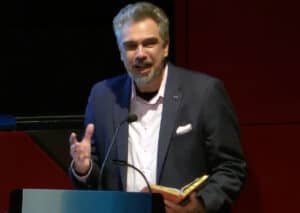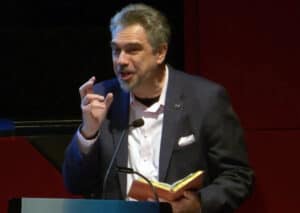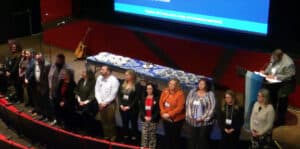Closing Worship Renews Commitment to Working Together for Justice in Health and Human Service Ministries
After a week filled with meaningful worship, learning, networking, and reconnecting with colleagues and friends, attendees to CHHSM’s 85th Annual Gathering in Denver met for closing worship March 9 in the special space of the Denver Art Museum.
Prior to the service beginning, Jamar Doyle, CHHSM’s president and CEO, thanked Archway Communities in Denver, one of the sponsors of the events, for its warm welcome as gracious hosts of CHHSM members while in Denver. The Rev. Dr. Lee Berg, chair of the Archway board and a newly-elected CHHSM board member, expressed thanks to CHHSM.
“It’s been our pleasure and delight to help sponsor this meeting,” Berg said. “It’s been so refreshing for me to learn the things I’ve been learning this week. Thank you for that opportunity to be a learner.”
Berg also thanked CHHSM for remembering Archway co-founder and board chair the Rev. Robb Lapp during the gathering. Lapp died in May 2022 at the age of 89.
Following opening music from the Rev. Tracy Howe, founder of Restoration Village Arts and team leader of Faith Education, Innovation, and Formation for the UCC’s Justice and Local Church Ministries — who had delivered the closing keynote address earlier in the day — was a gathering prayer led by the Rev. Julie Jennings, vice president of spiritual care and wellbeing at Cedar Community in West Bend, Wis., also a CHHSM board member. The sermon was delivered by Dr. Miguel De la Torre, activist and professor of social ethics and Latinx studies at Iliff School of Theology in Denver.
De La Torre preached on Ezekiel 37:1-10, about Yahweh lifting the author from the valley of dry bones. He opened with an analogy to the present, citing that we have a daily genocide in which 25,000 children die each day in our world. “We are stuck in the valley of the slain …,” he said, and added that he felt stuck in Holy Saturday, not knowing if Easter Sunday would ever come.
“We have this habit of picking up the one that makes it out of the valley of the bones, and put them on a pedestal and say, ‘See? Anyone can make it if they work hard enough,’” he said. “My fear and concern of this mountaintop hope is that it becomes a class privilege” where the privileged are not forced to live in the valley of the oppressed.
Our society is rife with the mountaintop hope of “if I keep my head down and work hard, I might survive,” he added.
“We have domesticated resistance to the point where we have to go to the police department to get a permit to protest the police department!” he said. “For those who live in the valley of death who have nothing to lose, that’s where we become dangerous … where we can mobilize.”
De La Torre added that “Eurocentric hope can lead to philosophical, not physical, redemption. Our minds have been so colonized by these Eurocentric doctrines that it makes God vomit. Our structures are designed to keep people in poverty.”
Then De La Torre paused. “But dissing hope – isn’t that the gift of the spirit – hope?”
He explained the difference between English and the Spanish word for hope. In Spanish, the word for hope is esperanza — from the root word meaning “to wait.”
“When I say ‘hope’ in Spanish, I’m saying WAIT — and I don’t know what I’m waiting for or how long I’m waiting. It’s not hope for my life,” he said.
De La Torre’s sermon focused on radical solidarity. “If I choose radical solidarity with the oppressed, it means I must embrace the hopelessness of the oppressed,” he said. “The dead bones in the valley are the norm. Easter Sunday may come, it may not, it may come in 400 years.”
He asked why bother, if the valley of oppression is the norm. “I fight for justice not because I think I’m going to win. I’m not going to win,” he said. “Racism and classism and sexism and heterosexism will all be major problems in this country. I am not going to bring any liberation to my people. But I don’t fight because I think I’m going to win. The reason I fight for justice is because within the very struggle, not only do I define my faith, but more importantly, I define my humanity.”
“I felt that the closing worship was particularly meaningful this year,” said Andrea Asselmeier, chaplain at Emmaus Homes in St. Louis. “Rev. Dr. Miguel A. De La Torre gave an incredible message that, along with Rev. Tracy Howe’s earlier message and music during the service, reminded me that we can and must make space for lament in our hearts and in a world while also having the hope necessary to continue to work for a world that more closely aligns with the love that God has for humanity.”
Following De La Torre’s moving sermon came a highlight of the Annual Gathering — consecrating the next class of health and human service leaders as Diakonal Ministers. The graduating class of the Nollau Leadership Institute — comprised of serving leaders from across the UCC churches, conference, national settings, and CHHSM agencies — were blessed with a special litany and prayer of consecration, and then presented with towels and bowls, symbols of their serving leadership in health and human service ministries.
Because food and beverages are not allowed in Denver Art Museum’s auditorium, in lieu of a traditional communion service, the worship service included a different sort of communion, geared to helping fill the empty places in attendees’ lives. “Take a few moments in silence and consider — where are those valleys of the slain that you recognize in our world, where you minister, in our own lives?” said the Rev. Shari Prestemon, conference minister of the UCC’s Minnesota Conference. “Fill those rattling places with our prayers, and with a hope that we will insist on holding however long it may be until they are realized.”
Attendees wrote on cards an experience that nourished and fed them during the Annual Gathering, and shared those messages that fed their spirit with each other.
“I was moved by the creativity of the planning of the closing worship and the communion service where bread and drink were prohibited,” said the Rev. Beth Long-Higgins, vice president for engagement and the director of the Ruth Frost Parker Center for Abundant Aging at United Church Homes. “Even when ritual elements are denied or forbidden, or when basic elements are unavailable, we can experience the sacred with the Spirit and each other through the sharing of the stories of our experience.”
Worship closed with a Benediction offered by De La Torre.
“CHHSM’s 85h Annual Gathering was filled with inspiration and, especially, hope,” said Jamar Doyle, president and CEO. “Even amid the mountains and valleys of our various ministries, there is always hope — in God, in each other, and in our journey together to create a more just, caring and compassionate world.”
Join Our Mailing LIst
"*" indicates required fields
Follow on Facebook
Cedar Community and the West Bend Theatre Company Announce Partnership - CHHSM
www.chhsm.org
Cedar Community in West Bend, Wis., and the West Bend Theatre Company (WBTC) announce recently that they will continue their partnership in the 2025 season. Following a highly successful run of Char...


